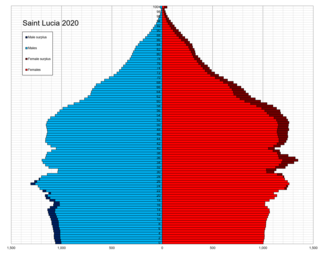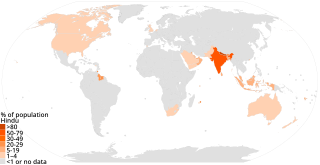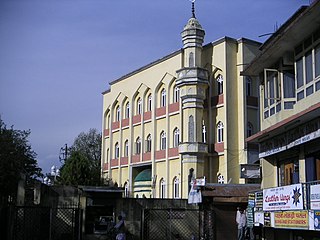Religion in Saint Lucia
According to a 2009 Pew Research Center report, Muslims constitute approximately 0.1% of the population in Saint Lucia. [1]
| Islam by country |
|---|
 |
According to a 2009 Pew Research Center report, Muslims constitute approximately 0.1% of the population in Saint Lucia. [1]
The majority of Muslims in the country is made up of local African descent converts and also immigrants from Middle East and South Asia. [2]
Registered in 2020, the Islamic Association of Saint Lucia is the organization representing the Muslims in the country. [3]
Demographics of the population of Saint Kitts and Nevis include population density, ethnicity, religious affiliations and other aspects.

Saint Lucia is an island country of the West Indies in the eastern Caribbean. The island was previously called Iouanalao and later Hewanorra, names given by the native Arawaks and Caribs (respectively), two Amerindian peoples. Part of the Windward Islands of the Lesser Antilles, it is located north/northeast of the island of Saint Vincent, northwest of Barbados and south of Martinique. It covers a land area of 617 km2 with an estimated population of over 180,000 people as of 2022. The nation's capital and largest city is Castries.

This is a demography of the population of Saint Lucia including population density, ethnicity, education level, health of the populace, economic status, religious affiliations and other aspects of the population.

Once a single-crop agricultural economy, Saint Lucia has shifted to a tourism and banking serviced-based economy. Tourism, the island's biggest industry and main source of jobs, income and foreign exchange, accounts for 65% of its GDP. Agriculture, which was once the biggest industry, now contributes to less than 3% of GDP, but still accounts for 20% of jobs. The banana industry is now on a decline due to strong competition from low-cost Latin American producers and reduced European trade preferences, but the government has helped revitalize the industry, with 13,734 tonnes exported in 2018. Agricultural crops grown for export are bananas, mangoes, and avocados. The island is considered to have the most diverse and well-developed manufacturing industry in the eastern Caribbean.

Saint Lucia maintains friendly relations with the major powers active in the Caribbean, including the United States, the United Kingdom, Canada, and France. Saint Lucia has no extant international disputes, aside from tension resulting from the island's status as a transit point for South American drugs destined for the United States and Europe.

Saint Vincent and the Grenadines is an island country in the Caribbean. It is located in the southeast Windward Islands of the Lesser Antilles, which lie in the West Indies, at the southern end of the eastern border of the Caribbean Sea, where the latter meets the Atlantic Ocean.
Saint Vincent and the Grenadines maintains close ties to the US, Canada, and the United Kingdom, and cooperates with regional political and economic organizations such as the Organisation of Eastern Caribbean States (OECS) and CARICOM. St. Vincent and the Grenadines is a member of the United Nations, the Commonwealth of Nations, the Organization of American States, and the Association of Caribbean States (ACS). Saint Vincent is also the smallest nation ever to be on the United Nations Security Council.

This is a demography of the population of Bahrain including population density, ethnicity, education level, health of the populace, economic status, religious affiliations and other aspects of the population.

Hinduism has approximately 1.2 billion adherents worldwide. Hinduism is the third largest religion in the world behind Christianity (31.5%) and Islam (23.3%).

Hinduism is the leading single religion of the Indo-Caribbean communities of the West Indies. Hindus are particularly well represented in Guyana, Suriname and Trinidad and Tobago. The Cayman Islands also hosts a sizable Hindu population, with 2.4 percent of the country affiliating with the religion. Smaller groups of Indo-Caribbeans live elsewhere in the Caribbean, especially Puerto Rico, Jamaica, Belize, Barbados, Saint Vincent and the Grenadines, Saint Lucia, and Bahamas.

The island nation of Saint Lucia is divided into 10 districts. The name Quarters or Quartiers originally came from the French period in Saint Lucia. The 2001 and 2010 Census of Saint Lucia refers to the first level administrative divisions as districts. The FIPS and ISO standards regularly called these divisions quarters or quartiers in French. The former district of Dauphin Quarter was merged into Gros Islet District and the former district of Praslin Quarter was merged into Micoud District.

Islam in the Indian Ocean was established by Muslim sea merchants well before the European discovery of Seychelles. However, unlike in other island states including the Comoros and Maldives, there were no permanent inhabitants in Seychelles until the French settlement in 1770. Today, the Muslim population of the islands is reported to be only 1.1%, roughly 900 people. Many of its island neighbors in the southern Indian Ocean, including Comoros, the Maldives and Zanzibar, have a much larger Muslim influence because of their settlement by Muslims, before European colonization. Mauritius also has a much higher Muslim population due to the importation of labour from British India on a scale not seen in Seychelles. The government of Seychelles allows 15 minutes of religious broadcasting every Friday for the Muslim community.

Islam is the third largest religion in Nepal. According to the 2021 Nepal census, approximately 1.483 million Muslims, comprising 5.09% of the population, live in Nepal.

Saint Vincent and the Grenadines is an overwhelmingly Christian majority country, with adherents of Islam being a minuscule minority. Due to secular nature of the country's constitution, Muslims are free to proselytize and build places of worship in the country.

Saint Kitts and Nevis is an overwhelmingly Christian majority country, with adherents of Islam being a minuscule minority. Due to secular nature of the country's constitution, Muslims are free to proselytize and build places of worship in the country.

Women in Malaysia receive support from the Malaysian government concerning their rights to advance, to make decisions, to health, education and social welfare, and to the removal of legal obstacles. The Malaysian government has ensured these factors through the establishment of Ministry of National Unity and Social Development in 1997. This was followed by the formation of the Women's Affairs Ministry in 2001 to recognise the roles and contributions of Malaysian women.
This ancient and sovereign order currently only issues passports to three of its officers, all of whom also hold passports issued by other sovereign states. Technically, if they lost their other passports, the three holders of Sovereign Military Order of Malta passports could travel to at least 104 countries and territories without acquiring visas in advance.
Indo–Saint Lucians or Indian–Saint Lucians, are Saint Lucians whose ancestry lies within the country of India, primarily the modern-day Indian states of Bihar, Jharkhand and Uttar Pradesh in Northern India. In 1859, the British began transporting indentured workers from British India to work on plantation estates in Saint Lucia, which had become a British colony in 1814. The first ship carrying 318 indentured workers from India, the Palmyra, arrived in Saint Lucia on 6 May 1859, and the last ship carrying Indian indentured workers, the Volga, arrived on 10 December 1893.
The COVID-19 pandemic in Saint Lucia was a part of the ongoing global viral pandemic of coronavirus disease 2019 (COVID-19), which was confirmed to have reached Saint Lucia on 13 March 2020. As of 2 September 2022, there are a total of 28,894 confirmed cases, of which 28,369 have recovered and 391 deaths have occurred.

Saint Lucian nationality law is regulated by the Saint Lucia Constitution Order of 1978, as amended; the Citizenship of Saint Lucia Act of 1979, and its revisions; and various British Nationality laws. These laws determine who is, or is eligible to be, a national of Saint Lucia. Saint Lucian nationality is typically obtained either on the principle of jus soli, i.e. by birth in Saint Lucia; or under the rules of jus sanguinis, i.e. by birth abroad to parents with Saint Lucian nationality. It can be granted to persons with an affiliation to the country, or to a permanent resident who has lived in the country for a given period of time through naturalisation. There is also, currently a program in Saint Lucia for persons to acquire nationality through investment in the country. Nationality establishes one's international identity as a member of a sovereign nation. Though it is not synonymous with citizenship, for rights granted under domestic law for domestic purposes, the United Kingdom, and thus the commonwealth, have traditionally used the words interchangeably.
{{cite web}}: CS1 maint: archived copy as title (link)